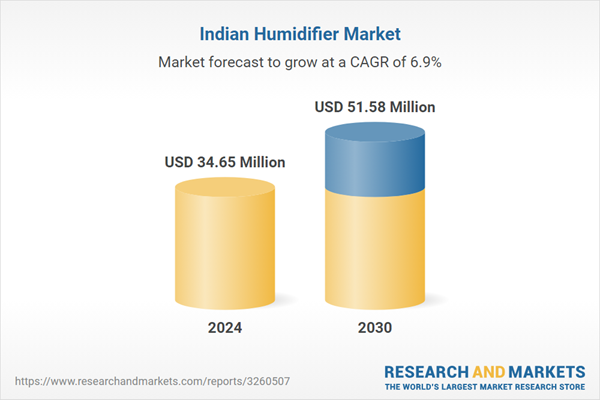Speak directly to the analyst to clarify any post sales queries you may have.
10% Free customizationThis report comes with 10% free customization, enabling you to add data that meets your specific business needs.
Key Market Drivers
Rising Awareness of Indoor Air Quality and Health Benefits
Growing awareness of the importance of indoor air quality and its direct link to respiratory well-being is a major driver of the India humidifier market. In 2024, data revealed that 206 out of 253 monitored cities exceeded PM10 pollution levels beyond NAAQS limits, highlighting the deteriorating air quality across the country. This has prompted consumers to seek in-home solutions for improving air conditions.Humidifiers help alleviate symptoms associated with dry indoor air such as nasal irritation, dry skin, allergies, and respiratory discomfort. Their use is especially beneficial during winters and in air-conditioned spaces. The COVID-19 pandemic also elevated public consciousness regarding air hygiene, leading to increased demand for supportive air care products. Medical professionals continue to recommend humidifiers to manage respiratory ailments such as sinusitis, cold, and asthma, which has further contributed to their growing popularity across Indian households and offices.
Key Market Challenges
High Initial Cost and Maintenance Expenses
The relatively high initial cost and maintenance requirements of humidifiers present a challenge to broader adoption in India. Advanced models with features like smart controls, integrated air purifiers, and automated sensors are often priced at a premium, limiting their accessibility for price-sensitive consumers. Regular maintenance is critical for these devices to function effectively, as unclean humidifiers can harbor mold and bacteria, potentially worsening indoor air quality. Additional expenses related to filter replacements and cleaning supplies further discourage long-term ownership. These factors are particularly prohibitive in semi-urban and rural areas where disposable income is lower, and awareness is limited. To improve penetration, manufacturers must focus on introducing affordable, low-maintenance models while simultaneously educating consumers on the long-term health and cost-saving benefits of using humidifiers.Key Market Trends
Integration of Smart Technology and IoT Features
A notable trend shaping the India humidifier market is the growing integration of smart technology and IoT functionalities. Today’s tech-savvy consumers prefer connected home devices that offer remote control, real-time air quality updates, and scheduling capabilities. Smart humidifiers that can be operated through mobile apps or voice assistants such as Amazon Alexa and Google Assistant are becoming increasingly popular. These models also feature automatic humidity adjustment based on sensor data, enhancing user convenience and energy efficiency. Integration with broader smart home ecosystems is making humidifiers more attractive, especially in urban centers. The ability to access performance analytics, set personalized settings, and receive maintenance alerts is positioning smart humidifiers as preferred choices among urban consumers looking for both comfort and functionality.Key Market Players
- Condair Group AG
- Ahata Industries
- Amfah India Trading Pvt. Ltd.
- Honeywell India Private Limited
- Crane USA Inc.
- Powerpye Electronics
- Philips India Limited
- Procter & Gamble Hygiene and Health Care Limited
- Guangdong Delmar Technology Co., Ltd.
- Swastik Refrigeration
Report Scope:
In this report, the India Humidifier Market has been segmented into the following categories, in addition to the industry trends which have also been detailed below:India Humidifier Market, By Product Type:
- Steam
- Ultrasonic
- Others
India Humidifier Market, By Coverage Area:
- Less Than 500 sq. ft
- 500-1000 sq. ft
- More Than 1000 sq. ft
India Humidifier Market, By Distribution Channel:
- Online
- Offline
India Humidifier Market, By Region:
- North
- South
- East
- West
Competitive Landscape
Company Profiles: Detailed analysis of the major companies present in the India Humidifier Market.Available Customizations:
With the given market data, the publisher offers customizations according to a company's specific needs. The following customization options are available for the report.Company Information
- Detailed analysis and profiling of additional market players (up to five).
This product will be delivered within 1-3 business days.
Table of Contents
Companies Mentioned
- Condair Group AG
- Ahata Industries
- Amfah India Trading Pvt. Ltd.
- Honeywell India Private Limited
- Crane USA Inc.
- Powerpye Electronics
- Philips India Limited
- Procter & Gamble Hygiene and Health Care Limited
- Guangdong Delmar Technology Co., Ltd.
- Swastik Refrigeration
Table Information
| Report Attribute | Details |
|---|---|
| No. of Pages | 80 |
| Published | July 2025 |
| Forecast Period | 2024 - 2030 |
| Estimated Market Value ( USD | $ 34.65 Million |
| Forecasted Market Value ( USD | $ 51.58 Million |
| Compound Annual Growth Rate | 6.8% |
| Regions Covered | India |
| No. of Companies Mentioned | 10 |









